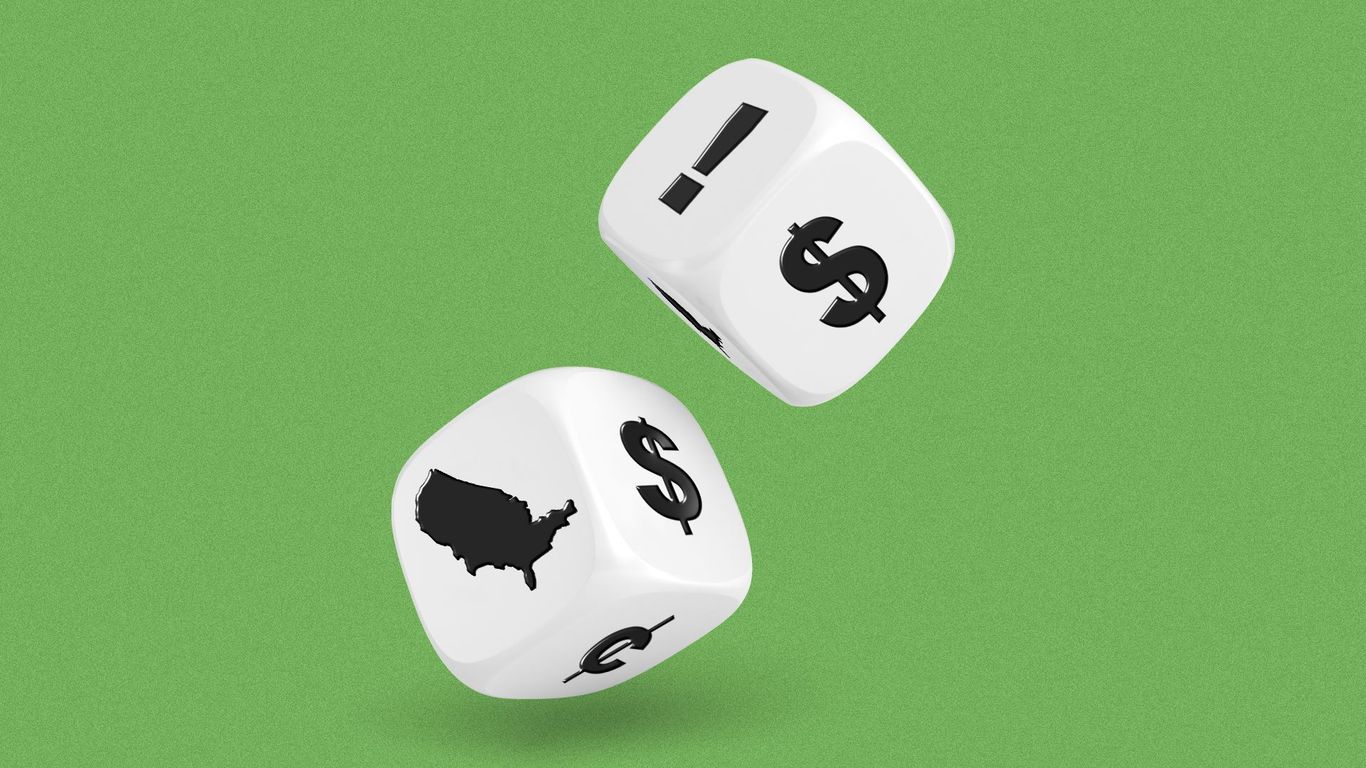President Trump's whiplash tariffs may have inadvertently achieved his goal of reordering the global economy by inspiring investors to sell U.S. assets and move their money elsewhere.
Why it matters: For decades, the world has invested in America. Now, a global moment of clarity threatens to redirect trillions of dollars of capital inflows and diminish the U.S.

in the international economic order.The big picture: The U.S.
receives nearly $2 trillion each year in foreign capital inflows, according to government data — things like investments in businesses and bank lending, but also foreign investors buying U.S. stocks and bonds.
America's share of global capital flows has nearly doubled from where it was just before the pandemic, to 41%.Yes, but: Then came the tariffs.The U.
S. dollar — which should strengthen in a tariff environment, all other things being equal — weakened steadily."This suggests foreigners have been and are continuing to sell U.
S. stocks and sending their money elsewhere," write Howard Ward and John Belton, co-chief investment officers of value at Gabelli Funds.The intrigue: A strong U.
S. dollar has been orthodoxy for decades, and investors have counted on knowing the government would act to preserve the greenback as the world's reserve currency.But Stephen Miran, the chair of Trump's Council of Economic Advisers, recently gave a speech in which he portrayed the strong dollar as fraught with downsides, denting U.
S. competitiveness and labor.If the government isn't going to stand as firmly by the dollar, investors may reason it's a good time to look elsewhere, too.
Between the lines: The tariff blowback only accelerates a trend that started not long after Trump took office, with investors preferring foreign markets over the U.S.The S&P 500 is one of the world's worst-performing major indices so far this year.
Look no further than Thursday, when Asian and European shares rallied sharply — and U.S. stocks sank.
There's also bond market pain, which the White House acknowledged as driving the tariff rollback. Lurking in the background: The fact that foreign investors hold almost 30% of publicly held U.S.
government debt, essentially split between private and state holders."(The) more troubling narrative of late is the notion of what we call a 'sell America Inc.' risk," interest rates strategists at ING wrote this week.
"(The) here and now is painting Treasuries as a tainted product, and that's not comfortable territory."The other side: For all the anxiety, the U.S.
economy is still the world's largest and remains attractive to plenty of investors.An auction of 10-year U.S.
Treasury bonds Wednesday was met with slightly better-than-normal demand, even amid the global chaos. Billions of dollars are still pouring into the United States to build new auto factories, data centers, and the like.What to watch: Whether this was a blip, or the start of a fundamental shift in the way the world views investing in America.
.
The world's hot new trade is "sell America"

President Trump's whiplash tariffs may have inadvertently achieved his goal of reordering the global economy by inspiring investors to sell U.S. assets and move their money elsewhere.Why it matters: For decades, the world has invested in America. Now, a global moment of clarity threatens to redirect trillions of dollars of capital inflows and diminish the U.S. in the international economic order.The big picture: The U.S. receives nearly $2 trillion each year in foreign capital inflows, according to government data — things like investments in businesses and bank lending, but also foreign investors buying U.S. stocks and bonds.America's share of global capital flows has nearly doubled from where it was just before the pandemic, to 41%.Yes, but: Then came the tariffs.The U.S. dollar — which should strengthen in a tariff environment, all other things being equal — weakened steadily."This suggests foreigners have been and are continuing to sell U.S. stocks and sending their money elsewhere," write Howard Ward and John Belton, co-chief investment officers of value at Gabelli Funds.The intrigue: A strong U.S. dollar has been orthodoxy for decades, and investors have counted on knowing the government would act to preserve the greenback as the world's reserve currency.But Stephen Miran, the chair of Trump's Council of Economic Advisers, recently gave a speech in which he portrayed the strong dollar as fraught with downsides, denting U.S. competitiveness and labor.If the government isn't going to stand as firmly by the dollar, investors may reason it's a good time to look elsewhere, too.Between the lines: The tariff blowback only accelerates a trend that started not long after Trump took office, with investors preferring foreign markets over the U.S.The S&P 500 is one of the world's worst-performing major indices so far this year.Look no further than Thursday, when Asian and European shares rallied sharply — and U.S. stocks sank.There's also bond market pain, which the White House acknowledged as driving the tariff rollback. Lurking in the background: The fact that foreign investors hold almost 30% of publicly held U.S. government debt, essentially split between private and state holders."(The) more troubling narrative of late is the notion of what we call a 'sell America Inc.' risk," interest rates strategists at ING wrote this week. "(The) here and now is painting Treasuries as a tainted product, and that's not comfortable territory."The other side: For all the anxiety, the U.S. economy is still the world's largest and remains attractive to plenty of investors.An auction of 10-year U.S. Treasury bonds Wednesday was met with slightly better-than-normal demand, even amid the global chaos. Billions of dollars are still pouring into the United States to build new auto factories, data centers, and the like.What to watch: Whether this was a blip, or the start of a fundamental shift in the way the world views investing in America.















